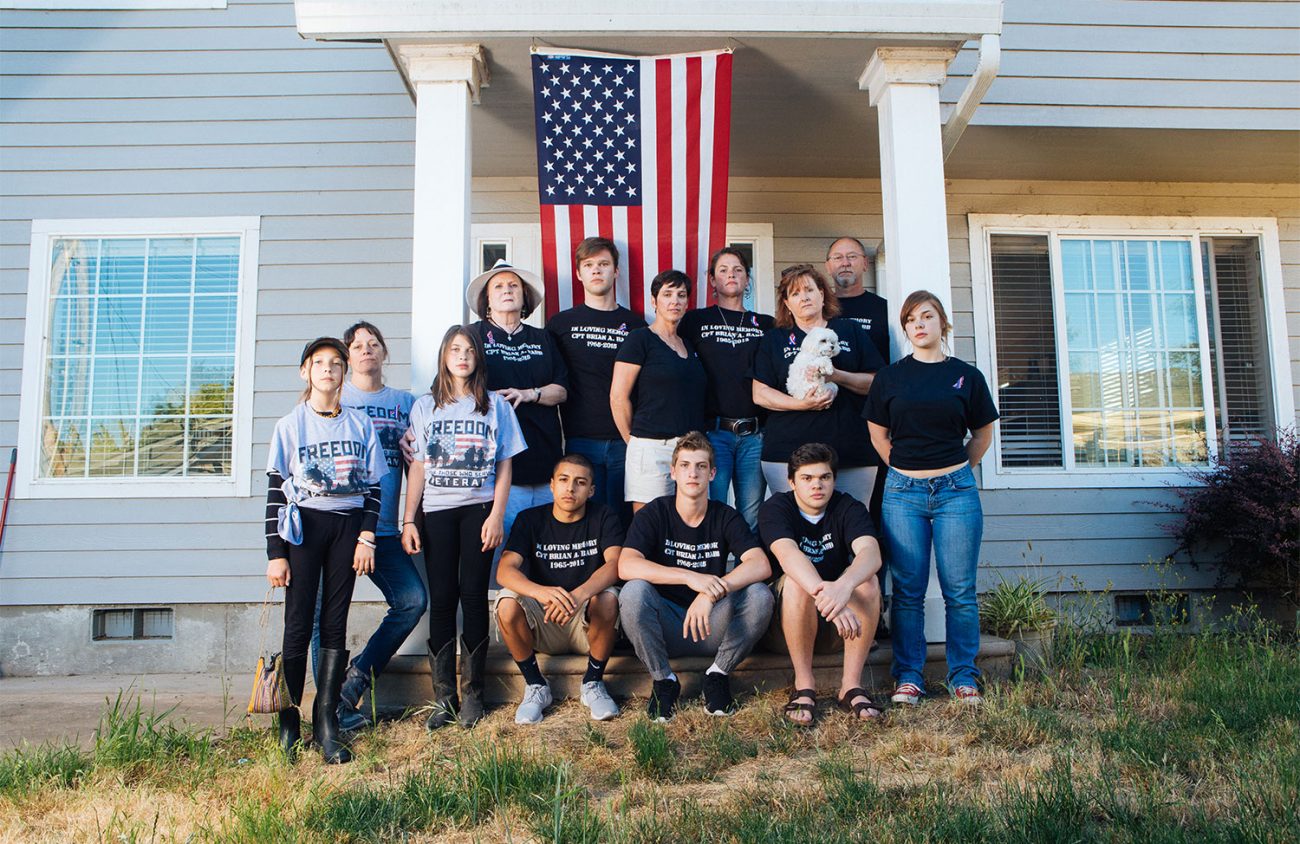The video from the armored vehicle is dull. The tank-like Bearcat pulls up to a tall fence. Over it, the camera barely shows the top of the front door of a nice little house on Devos Street.
There is no sound, no audio, just a barely visible door, and soon after the door opens, a police officer in the turret of the Bearcat shoots Brian Babb in the face, killing him.
But none of that is visible on the Bearcat’s video. In fact there is no video at all of the actual shooting of the 49-year-old military veteran. There is, therefore, no video showing whether Babb was pointing a rifle at the officer.
That rifle is a key detail, a recently filed court document agues, when it comes to whether Babb’s shooting was justified.
The police left his body in the doorway for six hours while they investigated. The photo in the court document shows Babb in shorts, his legs askew, just inside the doorway of the house. On the porch, a rifle lies to the right of the doormat. It was later found to be unloaded.
A police officer shot Babb on March 30, 2015. The bullet went in his left cheek and out the back of his head. The Eugene Police Department sent out the armored Bearcat only seven minutes after Babb’s therapist called 911, asking for help for her suicidal client.
Within an hour after the call, Babb was dead.
In March 2017, Babb’s family filed a $7.5 million lawsuit against EPD officers, including Will Stutesman, who shot Babb, and the city of Eugene. The suit alleges, among other claims, that the police unreasonably used deadly force against Babb.
On Nov. 13, Andrew Stroth, a Chicago-based civil rights attorney representing Babb’s family, filed a response to the city’s motion for summary judgment. A motion for summary judgment is basically a request for a court to rule that there is no case because anyone looking at the facts and the law would rule in favor of the moving party.
In the response to the motion, the lawyers representing the Babb family, including Babb’s two children, argue that Babb, a National Guard veteran who served in Afghanistan, did not point a gun at Stutesman.
In fact, the court documents allege that “post shooting, and prior to any photo or video being taken of the scene, including the existence of any rifle, officers, in particular Officer [Judson] Warden, had access to Mr. Babb’s residence, to Mr. Babb’s gun safe which was open, to Mr. Babb who was lying dead on his back inside the house, and to the front porch of the residence, without being photographed or video recorded.”
Reached by phone, Stroth tells Eugene Weekly, “It is our contention, as we laid out on our response to the motion, that Brian Babb never pointed a gun at any of the officers.”
He says that Officer Stutesman “unjustifiably and unconstitutionally shot Brian Babb, a decorated veteran and a person who was in a mental crisis.”
Stroth, whose Action Injury Law Group represents victims of police brutality, says, “It is our position that the Eugene Police Department took a military approach to a situation when there was a person in a mental health crisis, and two young adults and the Babb family no longer have Brian.”
He says, “It’s tragic, and it’s tragic on every level.”
The court document points out that the only other officer who could have seen if Babb was holding a rifle was Officer Joseph Kidd.
The documents cite Kidd as saying in his deposition transcripts that “I don’t recall seeing the rifle at the time that he went down and … I was watching him, what I could see of his body to see if he moved. I just don’t recall seeing a rifle at that time.”
The document alleges, “The only statement by Kidd purporting to observe a rifle in Mr. Babb’s possession is the one made over the radio six minutes after the shooting.”
And one of the things that could have made a difference in those minutes, according to the response to the motion for summary judgment, is Warden’s alleged access to the residence, gun safe and porch.
EPD spokesperson Melinda McLaughlin says via email, “We ordinarily would not respond to cases in active litigation, however in this case the allegations that Mr. Babb was unarmed or that officers planted evidence are patently false and unsupported by any evidence.”
She adds that the city of Eugene “will be submitting a reply on Dec. 12, which will address the inaccuracies point by point.”
Stephanie Babb, Brian’s sister, is not a party in the lawsuit. She says, “This, in particular, is really about our city responding to the community. We need answers.” The police, she says, “are the people we hire to take care of us.” She alleges EPD “tried to cover their tracks.”
After the shooting, Eugene police changed some department tactics in dealing with veterans and others in a mental health crisis. However, McLaughlin says she cannot comment on whether Babb’s death affected a standoff with two armed men at an apartment in south Eugene on Nov. 29 because the case is still being adjudicated.
“The first life he saved was like two weeks afterward,” Babb’s sister says of the changes.
Of her brother’s death almost four years ago, Stephanie Babb says, “One more goddamn Christmas, one more Thanksgiving, it doesn’t get easier. This is still happening, it hasn’t gone away.”
